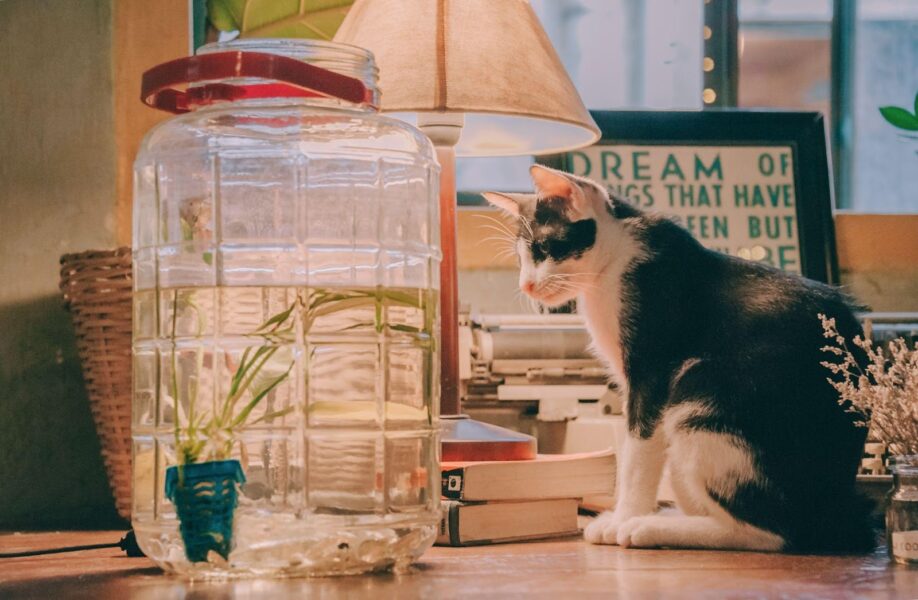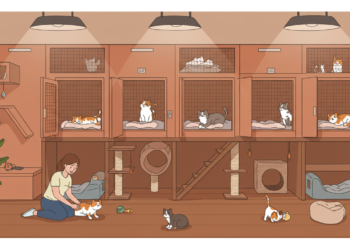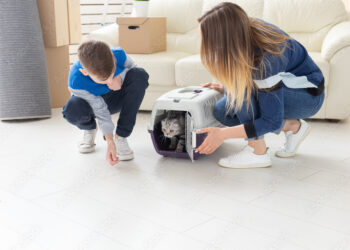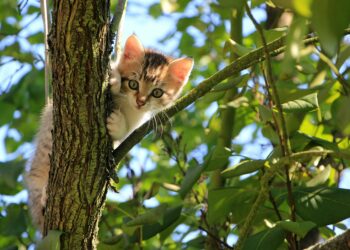If you want to buy a cat, the temptation is to go for looks. Because there are so many breeds, there is a beautiful cat for everyone. Nevertheless, it is useful to look especially at the character traits of a cat.
To know which character traits suit you and which do not, it is good to ask yourself a few questions first. The answers give you an idea of what you are looking for in a cat and which type of catsuit is best.
Buying a cat impulsively is not good. You have had a cat in your home for about 12 to 16 years on average, so a well-considered decision is not unimportant. Keeping a cat involves work. In addition, it is important to look for which type of cat best suits your family situation.
Choose a cat who is calm, and easy to be with, so that you can take them out with your family members. For instance, there are many cat cafes in the USA where you can hang out with other cats, learn more about them, and see who you vibe with the most. And if you find a cat that you really like, you can adopt them.
This means that you have to think about which character traits you experience in a cat as pleasant and which you do not. This way you arrive at the breed that suits you best. What you have to realize is that the character of a pedigree cat can be defined reasonably well, but that of most domestic or farm cats is more difficult.
A cat in the house
Before you buy a cat, it is important to realize that a pet always involves extra work. When keeping a cat in the house you have to think of various things such as:
- Clean litter boxes daily, complete weekly cleaning.
- Frequent vacuuming.
- Provide dry and possibly wet food daily.
- Make sure there is always fresh water.
- If the animal is unwell, visit the vet and arrange any care at home.
- Cleaning up ‘accidents’ with food or feces.
- Periodically check for pests and/or administer preventive agents.
- Long-haired cats should be combed/brushed regularly.
Attention
Paying attention to your cat doesn’t feel like ‘extra work’ for the enthusiast, but it will cost you time anyway. Every cat needs affection. That can be a pat on the head or a hug and the other time the cat wants to play with you. It is therefore important that you regularly take time for this.
One cat is more emphatic in asking for attention than the other cat. But paying attention to your cat is an integral part of keeping a cat anyway. It is a roommate who is part of your family situation. It does not matter whether the family situation is with or without children, with or without a partner, or with or without other pets.
Questions To Ask Yourself
Every cat is a unique individual. That does not alter the fact that broadly speaking, you can make a subdivision in character traits with pedigree cats. The differences in character traits make it easier for you to choose a certain breed. To better understand the character of the cat that suits you, it is good to ask yourself a few questions, such as:
- Do I want a calm cat or can it be a rather present cat?
- Do I want a cat that gets along with children or is that irrelevant?
- Do I want a cat that ‘chatters’ a lot or do I prefer a quieter cat?
- Do I want a cat that likes to sit with me a lot and cuddle or do I prefer not to?
- Do I want to be able to train a cat (to a certain extent) or does it not matter to me?
Purebred cats and their character traits
| Breed | Quiet | Affectionate | To talk | Playful | Particularities |
|---|---|---|---|---|---|
| Press | YES | YES | NEW | NEW | Climbs little |
| oriental shorthair | NEW | YES | YES | YES | Good to train |
| Siamese | NEW | YES | YES | YES | Playful into old age |
| ragdoll | YES | YES | NEW | NEW | Kids fine |
| British shorthair | YES | YES | NEW | NEW | Children fine + can stay alone longer |
| Maine Coon | YES | YES | NEW | YES | Kids fine + let’s train |
| Siberian forest cat | NEW | YES | NEW | YES | Single-minded + don’t leave alone for long |
| Sacred Birman | YES | YES | NEW | YES | Kids fine |
| Norwegian Forest Cat | YES | YES | NEW | NEW | Kids fine + loves water |
| Abyssinian | NEW | YES | YES | YES | Can’t stand alone + a real climber |
Press
The press is an ancient breed and one of the most popular. This is partly due to the friendly and gentle nature of this cat. She is affectionate but certainly will not intrude.
She also clearly needs ‘her own time’ and then likes to withdraw for a while. The household where this long-haired cat is most comfortable is the quiet household. If it is occasionally busier in the house, she must have a quiet place where she can retreat.
Of course, this cat can also play occasionally, but you will often find them lazing in a chosen spot. They are not climbers, so huge scratching posts won’t get much use.
Reading suggestions; 200+ Unique Female Cat Names for Your Cute Companion
Oriental Shorthair
This is a playful and intelligent breed and one of the few purebred cats trained well and followed commands. This does not mean that she will do everything you ask. It is, after all, a cat. This outgoing cat is affectionate and will often be around you. Furthermore, the oriental shorthair can be called a real ‘babbler’.
She can be quite present at times. She won’t accept ‘no’ and can even come across as domineering at times. Regularly taking time to socialize with her is important with this breed.
Siamese
In terms of character, the Siamese is somewhat comparable to the Oriental Shorthair. The Siamese and the Oriental Shorthair partly have the same ancestors, only the Oriental Shorthair also has a mix of other breeds in the family tree. What the Siamese excels at is its loyal and loving demeanor.
This cat likes to play with other cats and people, but she can also entertain herself with some nice toys. This breed plays into old age.
The Siamese is also known for being a ‘talker’. She responds to your voice by “talking” (meowing back) at different pitches. So it really is a bit like a conversation. She often asks for attention by using her voice.
Ragdoll
This intelligent and well-balanced cat is gentle, jovial, and sociable. The ragdoll has a remarkably relaxed attitude and can even appear somewhat submissive. She is definitely not unique. She likes to be around people and that can just be the visitors. When she comes out, she can just walk with someone nice to her.
She also does well in a family with (young) children and other pets. This cat will never intrude. Like the press, she is not overactive, she likes to laze around and play only occasionally.
British Shorthair
The British Shorthair is popular and somewhat comparable in character to the press, especially her affection and not being too pushy. More than the press, this cat is also very suitable for the family. What she needs little of is to be carried. She prefers to stand with her four paws on the ground, but then a bit close to humans. Furthermore, this cat has no problem staying alone for a little longer. This cat is very independent.
Maine Coon
This big cat is friendly, affectionate, and can take a lot. A feature that can be useful with small children in a family. The Maine coon is almost always cheerful, playful, and intelligent.
You can also contact this cat to have commands followed, to a certain extent. Furthermore, it is a calm cat that goes about her business. For a large cat, her sound is very subdued. She also uses her voice very limited.
Most cats don’t or hardly respond when you mention their name. This is not the case with the Maine coon. If you call her name, she will respond in most cases.
Siberian Forest Cat
The Siberian Forest cat is playful, intelligent, and a real cuddler. She does well in a family and she does not let herself be fooled. When she needs something, this cat demands attention without mercy.
This pedigree cat is a bit ignorant, so not everyone’s friend immediately seeks out visitors. It is also advisable not to leave this cat alone too much. If you prefer this cat but are away more often, then adding a companion is a possible solution.
Sacred Birman
This sweet cat with the cute white socks is extremely social, gentle, and very easygoing. The Sacred Birman likes the attention of people in her immediate environment, but can also entertain herself.
She is moderately active, fairly playful (until old age), and does not really make many demands on her living environment. She does very well with (young) children, other cats and also gets along well with dogs. It is a patient cat, which is relatively easy to keep.
Norwegian Forest Cat
This sturdy and tough-looking Norwegian forest cat is impressive because of its size, but it is also a very gentle and affectionate cat. She is not a cat of extremes and she is extremely easygoing. She is sweet, calm, even in her behavior, and has a playful moment every now and then.
This breed is social and gets along well with young children. Finally, it is quite striking that this cat, as one of the few cats, likes to stay in and around water. Think of playing with water from the running tap in the kitchen or in the shower with the water that runs into the drain. But she also jumps in a flooded bath.
This cat can swim just fine. Even the pond in the garden can be attractive to the Norwegian Forest Cat.
Abyssinian
With this old breed, it is important to know that this cat cannot stand alone. The Abyssinian is a playful and active breed but on cat terms. Provide sufficient climbing opportunities in the house, otherwise, plants and curtains are not safe.
Furthermore, it is a bit of a naughty cat, for example, she sometimes wants to consciously push something off the table or counter. But you can’t easily get angry with her because of her sweetness. She is affectionate and prefers to be near its owner. After all, this cat is a ‘talker’.
Domestic Or Farm Cats And Their Character Traits
A purebred cat is bred for external and internal characteristics and these are known. With kittens born from a house cat you usually have much less information about the character. If one of the parents is a purebred cat, then you have information from that side.
If you know the other parent (domestic cat), you can form an idea of the kittens’ character traits. If you don’t have that information, then it’s just a matter of waiting.
The real farm cat is different again. If you want to get a farm cat, it is useful to know from when the kittens came into contact with people. If the kitten has not been around people much (yet),
she is usually quite reserved or even shy. Where you get a pedigree cat at about 12 to 14 weeks, this is often 6 or 7 weeks with a house or farm kitten (sometimes even younger, which is not recommended).
Think of learning how to deal with domestic environmental sounds such as voices from other family members, the doorbell, the telephone, the vacuum cleaner, etc.
All this does not mean that if you put love, time, and energy into a house or farm kitten, you can have a very nice cat in the house. The character of these cats is not always immediately clear and it is good to realize this when you bring such a kitten into your home.
Finally
For a cat, you choose an average of about 12 to 16 years and it must therefore be a conscious choice. It will cost you a little time and energy, but you will get a lot of love in return. One cat is a bit more idiosyncratic than the other, but that idiosyncrasy also makes the cat such a nice pet for many cat lovers.









